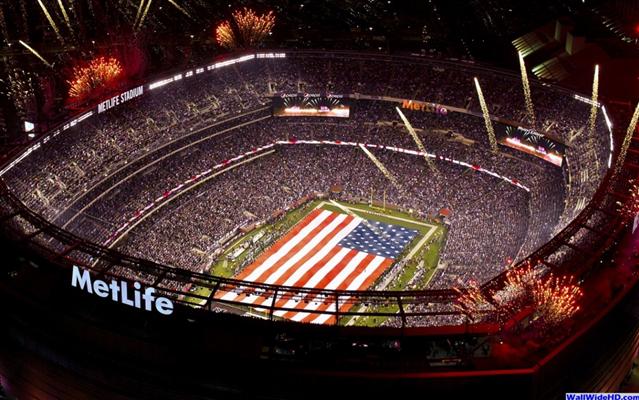[captionpix imgsrc=”https://pvnn.org/wp-content/uploads/2015/09/chrissports.jpg” captiontext=”Photo courtesy of getrealfootball.com“]
Football, baseball, basketball – these professional sports, and many more, have becoming a staple of American culture. Interestingly enough, these activities have also become a part of the American government. Within the last few weeks, Wisconsin Governor Scott Walker approved $250 million in taxpayer money to build a new basketball arena in Milwaukee.[ref]Chris Isidore, “Scott Walker OKs $250 Million in Taxpayer Dollars for Sports Arena,” CNNMoney, August 12, 2015, accessed September 20, 2015, http://money.cnn.com/2015/08/12/news/companies/scott-walker-tax-dollars-milwaukee-bucks-arena[/ref] Yet Milwaukee is not the only one – the government has always provided financial assistance to sport stadiums. Tax-exempt bonds have been used for decades to finance professional sport facilities. For instance, seventeen billion dollars in bond money has already been used for construction of major facilities in cities like Dallas and Tampa Bay. [ref]Aaron Kuriloff and Darrell Preston, “In Stadium Building Spree, U.S. Taxpayers Lose $4 Billion,” Bloomberg.com, September 4, 2012, accessed September 20, 2015, http://www.bloomberg.com/news/articles/2012-09-05/in-stadium-building-spree-u-s-taxpayers-lose-4-billion.[/ref] In light of the situation, how can the government promote the construction of sports arenas without spending so much tax payer money?
Building these stadiums, although quite expensive to the tax payer, actually hold a number of benefits. Bruce Seaman, an associate professor of economics at Georgia State University, stresses in particular that since these stadiums are owned by the public, the tax payer receives financial benefits of owning a facility. In other words, the average citizen received something like “rent money,” by funding these sports arenas. Furthermore, the people of the city may even unite if the local sports team is victorious in a game – proving that funding these sports arenas results in a value that goes beyond money.[ref] Tom Sabulis, “Pro/Con: Public Funds for Sports Stadiums?” Atlanta Forward Blog, May 22, 2014, accessed September 20, 2015, http://atlantaforward.blog.ajc.com/2014/05/22/procon-public-funds-for-sports-stadiums[/ref]
But despite these benefits, within this past year, economists from across the country disagree. Harvard professor Judith Grant Long discovered that, on average, seventy-eight percent of stadium costs usually fall on the tax payers. In 2009, for example, 125 percent of the costs for Jacksonville’s stadium was funded from public subsidies. In addition, according to the U.S. Treasury, tax-free bonds cost about $146 million dollars.
Besides the actual costs, tax breaks and bonds can also hurt citizens as well. In Hamilton County, Ohio, homeowners will be paying more in property taxes, for the third time in about five years. Moreover, Hamilton County residents received tax breaks that were much lower than promised. These low tax breaks were due to emerging unforeseen costs, like land subsidies, operational costs, capital improvements, city services, and the lack of revenue from the stadium’s property tax exemptions.[ref]Jolie Network, “Taxpayers on the Hook for Stadium Costs,” USA Today, November 25, 2013, accessed September 20, 2015, http://www.usatoday.com/story/news/nation-now/2013/11/25/stadiums-taxpayers/3663541[/ref] In another example, Philip Porter, from University of South Florida, also concluded that even mere training of the sports teams does not provide fiscal benefits either. To determine the actual economic impact, Victor Matheson, an economist at Holy Cross, says to “take whatever number the sports promoter says, take it and move the decimal one place to the left. Divide it by ten, and that is a pretty good estimate of the actual economic impact.” [ref]”The True Economics of Taxpayer Funded Stadiums,” Americans for Prosperity Florida, April 18, 2013, accessed September 20, 2015, http://americansforprosperity.org/florida/article/the-true-economics-of-taxpayer-funded-stadiums[/ref]
Sports leagues simply do not need the government to pay for these sports facilities since these organizations rake in tons of profit themselves. Last season, the National Football League (NFL) received about $7.24 billion in revenue from its thirty-two teams, with each team receiving $226.4 million – that is enough funding for ten space missions to Pluto. And according to the data, the revenues for the NFL are only increasing. In 2005, the revenue for each team was a little bit above sixty million dollars, and has almost quadrupled in less than ten years. [ref]James Brady, “The NFL Brought in Enough Money Last Year to Pay for 10 Pluto Missions,” SBNation.com, July 20, 2015, accessed September 20, 2015, http://www.sbnation.com/nfl/2015/7/20/9006401/nfl-teams-revenue-tv-deal-7-billion.[/ref] Suffice to say, if the NFL has the money to fund for their own stadium, it should not be the responsibility of the government to fund it with hard earned taxpayer money.
The money that is going into these stadiums could have been used for programs in education, public health, or roads but instead they are being used wastefully on these stadiums. Furthermore, there are several citizens who do not follow or care about sports, so to have them pay for something that is outside the scope of their interests is unfair to them. Officials should strive to restrict public funding from these stadiums. While Obama and his administration have put forth bills to restrict public funding, there is still more that needs to be done. The American people should stand up to the government and these wasteful programs. There needs to be a complete cutoff from government assistance, and let the sports teams figure it out for themselves.
Take Action:
The following petition is for President Barack Obama. This petition calls for prohibition of public funding for sports stadiums.
The following petition will be delivered to the Rhode Island State House, Senate, and Governor. This petition will help Rhode Island taxpayers speak up against a new PawSox stadium.



